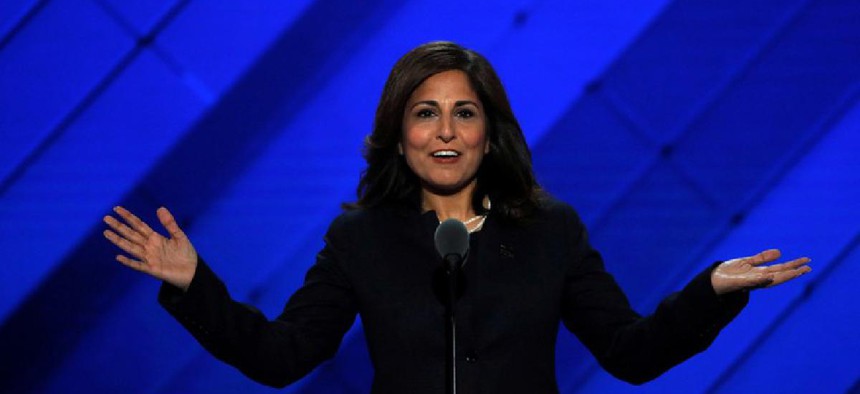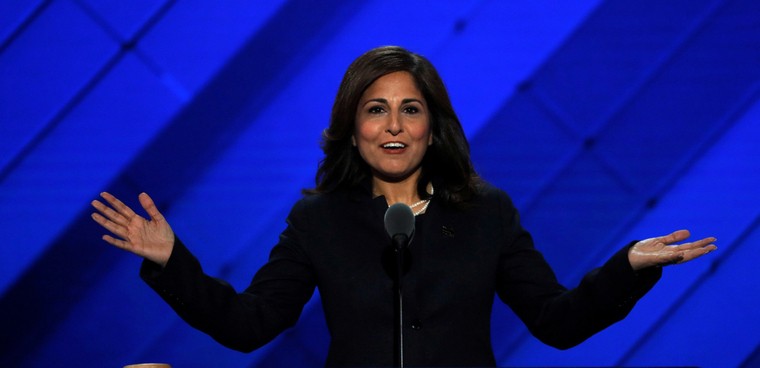Tech and tweets: Tanden talks policy and social media on Capitol Hill

President Biden's nominee for OMB director came under fire during her hearing for mean tweets aimed at Republican lawmakers. "I regret the language," she said.

Photo credit: John Smith Williams/Shutterstock.com
Government IT modernization, customer-friendly technology and cybersecurity will be "top priorities" for Biden's nominee to director of the Office of Management and Budget, Neera Tanden, if she's confirmed.
The OMB director plays a central role in the creation of the president's annual budget, as well as oversight of executive branch agencies and the steering of administration policy. Importantly, the OMB director also has oversight of the deputy director of management and the federal CIO. Tanden told lawmakers that she will prioritize tech and cyber issues if she's confirmed.
"It's an irony that in the United States, we have the greatest technology innovations," but "small businesses can't find out if they can get access to a small business loan as efficiently and effectively as possible," she told lawmakers during her hearing Tuesday before the Senate Homeland Security and Government Affairs Committee.
Sen. Maggie Hassan (D-N.H.), who has been active on the subject of IT modernization, asked Tanden what Congress could do to help the OMB work on technology issues.
The real challenge is funding, Tanden said.
"It takes an investment of resources in one year," she said. "We don't have capital budgets or other systems."
The shoring up and use of the Technology Modernization Fund (TMF) would be central to technology work, Tanden said, as would the use of the IT Oversight and Reform Fund.
House Democrats had sought a $9 billion boost to the TMF as part of the latest round of pandemic relief and recovery legislation, but that effort was scuppered after objections arose among senators.
Tanden told lawmakers that OMB's role in helping federal and state agencies with their technology could ultimately help citizens understand what government services are available to them, maybe even with apps or tech bots.
Modernizing IT "is really, I believe, a way in which we can make the federal government much more efficient, much more effective, and much more directed to the needs to customers, the American citizens," Tanden said.
The hearing also spotlighted the major SolarWinds hack and how the federal government might best respond.
Most affected agencies failed to notify Congress about the experience of a "major incident" in cybersecurity, a phrase that OMB is in charge of defining, Sen. Rob Portman (R-Ohio) told Tanden. He asked her if she would review those standards as OMB director.
"Transparency to the Congress and the public around cyber incidents is really vital," she assured him and other lawmakers.
"I believe SolarWinds really demonstrates the challenge of ensuring cybersecurity. It's a high risk area that sometimes agencies have not sufficiently focused on," she said. "I am appreciative that the President has proposed significant resources to shore up cybersecurity… it will be a high priority."
Committee chairman Sen. Gary Peters (D-Mich.) concentrated his questions on the cybersecurity workforce in the federal government. He voiced his intention to reintroduce the Federal Rotational Cyber Workforce Act, which would set up a rotational cyber program in the government in an attempt to help attract and retain a cybersecurity workforce.
Tanden also pointed to the potential example of the U.S. Digital Service in attracting technical talent to the federal government and solving tech problems.
"The USDS has been effective in working with agencies on what I would describe as sort of killer challenges around technology," she said. "That's been an innovative mechanism in how we share information and use resources like that to affect cybersecurity, not just the delivery of services, I think is something that I'm very interested in exploring."
The hearing also centered on Tanden's past. Most recently, she has been president and CEO of the left-leaning think tank, the Center of American Progress. Since Tanden's nomination to the position, some Republican lawmakers have pointed to inflammatory language on Tanden's Twitter account, some of which has been aimed at Republican lawmakers themselves.
"Typically the OMB director is not a partisan in particular because you have to have these kinds of relationships," Portman, himself a former OMB director, said. "I'm concerned that your personal attacks about specific senators will make it more difficult to work with them."
Tanden addressed the concerns during her opening remarks.
"I know there have been some concerns about some of my past language in social media and I regret that language and take responsibility for it," she said.
She also noted that her think tank role was inherently different from the OMB nomination in that included advocacy.
"I understand, though, that the role of OMB director calls for bipartisan action, as well as nonpartisan adherence to facts and evidence," she said.
If she's confirmed, she'll work to win over the trust of Republican lawmakers and be a nonpartisan leader, Tanden told lawmakers.
"We are committed to an evidence based approach," she said. "The policymaking and decision-making process should really always be guided by facts and evidence [and] analysis of real impact on people's lives."



